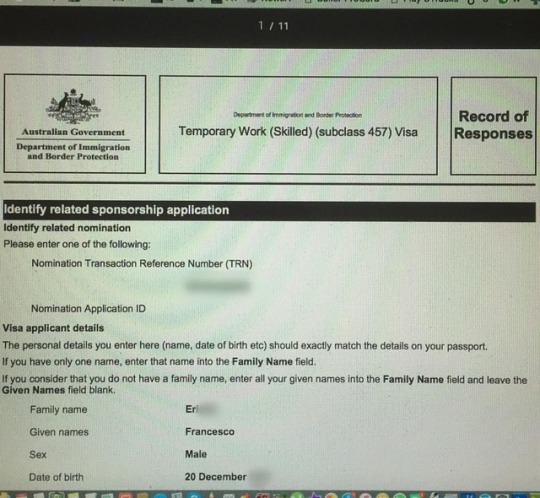#sponsorvisa
Explore tagged Tumblr posts
Text
How A Step-by-Step Guide to the Certificate of Sponsorship for UK Visas
This blog provides a comprehensive and easy-to-follow guide to understanding the Certificate of Sponsorship (CoS), a vital part of the UK’s immigration system, specifically for employers who wish to hire foreign workers under the Skilled Worker Visa or other employment-related visa routes.
Introduction to the Certificate of Sponsorship
The blog opens by explaining the fundamental role of the Certificate of Sponsorship (CoS) in the UK immigration process. The CoS is a digital document issued by a licensed sponsor (usually an employer) to confirm that they are offering a valid job to a foreign worker and are willing to sponsor their visa application. This document is essential for anyone applying for a Skilled Worker Visa or other related visas that require employer sponsorship. It’s a reference number, rather than a physical certificate, and is tied to the employee’s visa application.
Step 1: What is a Certificate of Sponsorship?
The blog starts by defining what the Certificate of Sponsorship is. It highlights that the CoS is a confirmation from an employer to the Home Office that they have a legitimate job offer for a foreign worker and that the worker will be sponsored for their visa. This section also clarifies that the CoS is a requirement for anyone applying for a Skilled Worker Visa or similar immigration routes. Without the CoS, applicants cannot submit their visa application.
Step 2: Check Sponsorship Eligibility
Before employers can assign a CoS, they must ensure that they are eligible to do so. The blog details the importance of being a licensed sponsor under the UK’s immigration system. To obtain this license, an employer must prove that their business is legally operating in the UK, financially stable, and capable of managing the responsibilities of sponsoring workers. This part of the blog emphasizes that only those who hold a sponsorship licence can assign a CoS to an employee.
Step 3: Choose the Correct Type of CoS
The blog continues by explaining the two main types of Certificates of Sponsorship: restricted and unrestricted.
Restricted CoS is typically issued for roles that are subject to an annual cap and are usually for new hires. These roles must meet certain salary and skill level thresholds and are more limited in number.
Unrestricted CoS is not subject to the annual cap and is typically used for employees already in the UK or for certain highly skilled roles.
Employers must ensure they apply for the correct type based on the employee’s circumstances, as this can affect the approval process.
Step 4: Assigning the CoS
Once the employer’s sponsorship licence is approved, they can assign a CoS to the foreign worker. This is done through the Home Office’s online sponsorship management system. The blog emphasizes that the CoS is a reference number, not a physical document. The worker needs this number to submit their visa application. This step is critical, as an incorrect or incomplete CoS can delay or derail the visa process.
Step 5: Provide Detailed Information
This section discusses the importance of accuracy when assigning the CoS. Employers must ensure that all details provided—such as the job role, salary, and employment terms—are accurate and comply with UK immigration rules. The Home Office will review the CoS assignment to ensure that the role meets the skill level, salary requirements, and other eligibility criteria set out for the visa. Failing to provide accurate information can result in the visa application being rejected.
Step 6: Maintain Compliance
The blog stresses that obtaining and assigning the CoS is not the end of the employer's responsibilities. Employers must maintain ongoing compliance with immigration rules. This includes keeping records of employees’ immigration status and reporting any changes to the Home Office. Non-compliance can result in penalties or even the loss of the sponsor licence.
Conclusion
Finally, the blog wraps up by reassuring employers that, while the CoS process can seem complex, following the steps carefully will lead to successful visa applications for foreign workers. It offers guidance from MRK Immigration, emphasizing that professional assistance can simplify the process. Employers are encouraged to contact the firm for tailored advice.
In summary, this blog provides employers with a detailed understanding of the Certificate of Sponsorship process, including the eligibility requirements, the types of CoS, how to assign one, and how to stay compliant. It highlights the importance of getting the process right to avoid delays and complications in sponsoring foreign workers for the UK.
#SkilledWorkers#UKImmigration#ImmigrationServices#CertificateOfSponsorship#VisaSponsorship#MRKImmigration#UKVisa#WorkInTheUK#SponsorshipLicence#UKWorkVisa#ImmigrationAdvice#UKJobs#SkilledWorkerVisa#WorkVisaUK#ImmigrationSupport#WorkInUK#SponsorVisa#UKEmployment#ImmigrationHelp
0 notes
Text
Things To Know About Employer Sponsor Visa In Australia
Australia is known for its diverse economy, which makes it an attraction point for many skilled workers. There are many visa programs for individuals who wish to work in Australia. The most popular visa category in Australia is the employer sponsor visa. In this blog, we will learn more about this visa.
Employer Sponsor Visa
An employer-sponsored visa, as the name suggests, is a type of visa that allows an individual to work in Australia under the sponsorship of an Australian employer. The employer who sponsors the individual takes full responsibility for them. If you want to migrate to Australia, you must have good work experience and qualifications to apply for this visa program.
There are three categories under employer sponsor visa in Australia that you can apply for according to your qualifications - Temporary Skill Shortage Visa, Employee Nomination Visa, and Regional Sponsored Migration Visa.
Temporary Skill Shortage Visa
This program allows an individual to migrate to Australia for work. This visa aims to fulfil the worker shortage in the country. The person who is willing to apply for this visa must be invited by an approved employer and meet the suitable skills requirements.
Employee Nomination Visa
This program, also known as subclass 186 visa in Australia, is a permanent visa that allows skilled workers to work and live in Australia permanently. To be eligible for this visa, the individual must be nominated by their employer and meet the relevant skills and qualifications requirements.
Regional Sponsored Migration Visa
This visa permits the individual to stay and work in Australia permanently. If an authorised employer sponsors the individual to work in the country, they can apply for a permanent work sponsorship visa. The individual must have the required skills to be eligible for this visa.
0 notes
Photo

Are you skilled Worker ? New pathway to Australian Permanent for low skilled workers. Call for an appointment +61 0280410696 | +61 402282701 www.connect2study.com.au
#australiaimmigration#australiavisa#australiaprvisa#immigrationconsultant#migrationsAustralia#migrationAustralia#immigrationconsultants#skilledVISA#connect2study#sponsorvisa#workVisa
0 notes
Text
How to Sponsor your Spouse from India | The World Migration
Are you interested in finding out how to sponsor your spouse from India for Canadian immigration?

Apply Now: Click Here
#sponsorvisa#spousevisa#canadaimmigration#canadaprvisa#canadianimmigration#moveincanada#theworldmigration
0 notes
Link

#Australiavisa#Australiaskilledvisa#australiaimmigration#skilledvisa#sponsorvisa#employementinaustralia#bangalore#mumbai#pune#Delhi#india
0 notes
Video
tumblr
According to the most recent updates from the Federal Authority for Identity and Citizenship (FAIC), the three-year visa validity period will no longer be available for all visa applications in the UAE, including new visas, visa renewals, and visa transfers. Now you can apply for validity for one or two years.
For more information and queries related to visa services, kindly contact us:
🌐 https://rvguae.com/
📞+971 56 164 3075 | +971 56 679 6910
0 notes
Photo

Another year... another 457 visa application. By now I have the record of 457 visas, 14 years of this application done and obtained... and payed 1000$ every year. Been doinf this since 2004 when I started to come to Australia regularly every year. I should just ring the Immigration and say my name give my credit card to get it automatically 😂😂😂 #workingvisa #457 #457visa #australianvisa #immigration #noteasy #immigrazione #sponsor #sponsorvisa #mylife #francescoadventures #onepictureadayfrancesco #inviaggioconfrancesco #onepictureadayitaly © Foto Copyright @francesco_eri
#noteasy#mylife#inviaggioconfrancesco#457#immigrazione#francescoadventures#sponsorvisa#onepictureadayfrancesco#immigration#sponsor#australianvisa#457visa#workingvisa#onepictureadayitaly
0 notes
Photo

Attn: Get Up to 45% OFF across all our services. For the next 24hr Only! ✔️Permanent Residency ✔️Study Visa Website: www.boi-services.com WhatsApp: +91 7827600972 for FREE Consultation .. #PermanentResidency #StudyVisa #SponsorVisa #TravelVisa #JobAssistance #BOIServices #DiwaliOffer
0 notes
Text
The Consequences of Late Self-Assessment Submissions.
Why Professional Help is Essential?
Filing your self-assessment tax return on time is crucial to avoid penalties and complications with HMRC. Many taxpayers underestimate the importance of meeting the January 31st deadline, which leads to costly consequences. Whether you are a self-employed individual, a freelancer, or a small business owner, the complexities of the self-assessment tax filing process can cause delays. This is why professional assistance is invaluable in ensuring that your taxes are filed accurately and on time.
Financial Penalties
The most immediate and significant consequence of Late Self-Assessment Submissions is financial penalties. HMRC imposes fines that increase over time if you miss the January 31st deadline. For example, an initial £100 penalty is charged for being late, with additional daily penalties of £10 after three months. These can quickly accumulate, leading to a hefty bill.
Additionally, after six months, HMRC may charge 5% of the total tax due, or £300, whichever is greater. The fines don’t stop there—after 12 months, further penalties apply, potentially increasing your financial burden even more. A professional tax advisor can help you avoid these penalties by ensuring that your return is submitted on time.
Interest on Late Payments
Beyond the fines, HMRC will charge interest on any unpaid tax after the submission deadline. This means that the longer you delay filing your self-assessment, the more you will owe. A tax professional can help you calculate the correct tax liability, minimizing the risk of underpaying and reducing the chances of incurring interest charges.
HMRC Investigation Risk
Late submissions can raise red flags with HMRC, potentially leading to a tax investigation. When a return is submitted late, or inconsistencies are found in the filing, HMRC is more likely to scrutinize your financial records. This can be a stressful and time-consuming process, especially if you are not prepared. Professional tax advisors have the expertise to file accurate returns and reduce the likelihood of triggering an investigation.
Missed Opportunities for Tax Relief
When you rush to submit a late self-assessment tax return, you may overlook valuable opportunities for tax relief. Claiming allowable expenses, deductions, or other reliefs can significantly reduce your tax liability. By working with a professional, you can ensure that every eligible tax-saving opportunity is utilized, even if deadlines are tight.
Conclusion
The consequences of Late Self-Assessment Submissions can be severe, with penalties, interest charges, and potential HMRC investigations. To avoid these issues, seek professional help to ensure that your self-assessment tax filing is accurate and timely. Expert tax advisors can help you meet deadlines, claim tax relief, and avoid costly mistakes. Visit tax-self-assessment.co.uk today to get the professional support you need.
#SelfAssessment#TaxFiling#LateSubmission#TaxRelief#TaxFiler#January31stDeadline#UKTaxpayers#TaxPenalties#HMRC#TaxAdvice#SelfAssessmentHelp#sponsorvisa
0 notes
Text
What are the benefits of the UK Innovator Visa?
The UK Innovator Visa is designed for experienced businesspersons looking to set up an innovative business in the UK. The benefits include:
The ability to bring family members (spouse/partner and children) to the UK.
The possibility of settling in the UK after three years.
Access to the UK market to grow and scale your business.
No minimum salary requirement, as it focuses on your business’s innovation, viability, and scalability.
The application process requires a viable business idea endorsed by an approved endorsing body. You must also have at least £50,000 in investment funds if your business is new.
For detailed information, visit our Innovator Visa page.
#visit our Innovator Visa page.#ImmigrationAdvice#SpouseVisa#SkilledWorkerVisa#UKVisaAdvice#StudentVisa#SponsorVisa#StartUpVisa#VisitorVisa#UKImmigration#VisaExtension
0 notes
Text
What are the options for bringing a domestic worker to the UK?
Bringing a domestic worker to the UK involves applying for a domestic worker visa, which allows you to bring your private household staff, such as a cleaner, nanny, or chauffeur, to the UK.
To qualify, you must be a British citizen or a foreign national with the right to live in the UK. The domestic worker must have been employed by you for at least one year prior to applying for the visa.
The application process involves completing an online form, paying the visa fee, and attending a biometric appointment. You must provide supporting documents, such as an employment contract, proof of the worker’s employment with you, and evidence of your legal status in the UK.
The domestic worker must demonstrate that they will leave the UK at the end of their employment and that they can support themselves without relying on public funds. They must also meet the English language requirement and provide a valid passport.
For detailed information, visit our domestic worker visa page.
#ImmigrationAdvice#FamilyVisa#IndefiniteLeaveToRemain#AdultDependentRelativeVisa#VisitVisaExtension#BritishCitizenship#EntrepreneurVisa#SponsorVisa#VisaRights#UKImmigration
0 notes
Text
What is the process for applying for a UK visitor visa for medical treatment?

If you need to visit the UK for private medical treatment, you can apply for a visitor visa. The requirements include:
Providing evidence of the medical condition you need treatment for.
Showing that you have made arrangements for the treatment at a private medical facility in the UK.
Demonstrating that you have enough funds to pay for the treatment, accommodation, and living expenses without working or accessing public funds.
Providing a letter from your doctor or medical practitioner outlining the details and duration of the treatment.
The application process involves completing an online form, paying the visa fee, and attending a biometric appointment. You will need to provide supporting documents, such as medical reports, proof of funds, and accommodation arrangements.
For more information, visit our visitor visa for medical treatment page.
#ImmigrationAdvice#SpouseVisa#SkilledWorkerVisa#UKVisaAdvice#StudentVisa#SponsorVisa#StartUpVisa#VisitorVisa#UKImmigration#VisaExtension
0 notes
Text
How do I apply for British citizenship?

Applying for British citizenship is a significant step that involves meeting several criteria and completing a detailed application process.
First, you must have lived in the UK for at least five years, or three years if you are married to a British citizen. During this period, you must have held indefinite leave to remain (ILR) for at least 12 months (unless you are married to a British citizen, in which case ILR is not required for the full 12 months).
You also need to demonstrate your knowledge of the English language and life in the UK. This can be done by passing the Life in the UK Test and proving your English proficiency through an approved test or a degree taught in English.
You must meet the good character requirement, which involves proving that you have not engaged in any criminal activities, immigration violations, or other conduct that would disqualify you from citizenship.
The application process involves completing an online form, paying the fee, and attending a biometric appointment. You must submit supporting documents, such as proof of residence, ILR, and evidence of meeting the English language and Life in the UK requirements.
After submitting your application, you will be invited to attend a citizenship ceremony if your application is successful. During the ceremony, you will make an oath of allegiance to the UK and receive your citizenship certificate.
For comprehensive guidance, visit our British citizenship page.
#ImmigrationAdvice#FamilyVisa#IndefiniteLeaveToRemain#AdultDependentRelativeVisa#VisitVisaExtension#BritishCitizenship#EntrepreneurVisa#SponsorVisa#VisaRights#UKImmigration
0 notes
Text
What are the rights and responsibilities of visa holders in the UK?
As a visa holder in the UK, you have specific rights and responsibilities that you must adhere to. These are designed to ensure that you comply with UK immigration laws and maintain your visa status.
Your rights as a visa holder depend on the type of visa you have. Generally, you are allowed to live, work, or study in the UK, as specified by your visa conditions. You may also have access to public services, such as healthcare and education, depending on your visa category.
You have the right to be treated fairly and without discrimination. Employers must ensure that your working conditions meet UK standards, and you should receive the same employment rights as other workers in the UK.
Responsibilities of visa holders include complying with the conditions of your visa. This means you must not engage in activities that are not permitted under your visa, such as working if you have a student visa or overstaying your visa expiry date.
You must also ensure that you keep your personal information up to date with the Home Office. This includes reporting any changes in your address, marital status, or employment status. If you change employers, you may need to apply for a new visa.
Failing to comply with your visa conditions can result in penalties, including fines, deportation, or being banned from re-entering the UK.
For more information, visit our rights and responsibilities page.
#ImmigrationAdvice#FamilyVisa#IndefiniteLeaveToRemain#AdultDependentRelativeVisa#VisitVisaExtension#BritishCitizenship#EntrepreneurVisa#SponsorVisa#VisaRights#UKImmigration
0 notes
Text
What are the options if I want to change my visa category?
Changing your visa category involves submitting a new visa application and meeting the criteria for the new visa type. The process and requirements vary depending on the visa categories involved.
The first step is to determine the eligibility criteria for the new visa category you wish to switch to. For example, if you are switching from a student visa to a skilled worker visa, you will need to secure a job offer from a UK employer who holds a valid sponsorship license and meets the skill and salary thresholds for the skilled worker visa.
You must also ensure that you meet all the requirements for the new visa category, including any specific documentation or evidence needed. This may involve providing proof of employment, financial status, or academic qualifications, depending on the visa type.
To apply for a new visa category, you will need to complete the appropriate online application form and pay the application fee. You may also need to pay the Immigration Health Surcharge, which grants you access to the NHS during your stay.
In some cases, you may need to attend a biometric appointment where your fingerprints and photograph will be taken. Processing times for visa changes can vary, so it’s important to apply well in advance to avoid any gaps in your visa status.
It’s also important to consider the impact of changing your visa category on your current visa status. For instance, you must ensure that your current visa remains valid while your new application is being processed.
For comprehensive guidance on changing your visa category, visit our UK visa advice page.
0 notes
Text
What should I do if my visa application is delayed?
Experiencing a Delay in Your Visa Application
Experiencing a delay in your visa application can be stressful, but there are steps you can take to address the situation and minimize its impact on your plans. Here’s a comprehensive guide on how to manage visa delays effectively.
1. Check Your Application Status Begin by checking the status of your application online. The UK Visa Immigration (UKVI) website provides tools to track your application progress. By entering your application reference number and personal details, you can gain insights into the current status of your application and identify any issues that may need your attention.
2. Contact UKVI for Updates If your application is significantly delayed beyond the expected processing time, consider reaching out to UKVI directly. You can inquire about your application's status through their customer service channels. Be prepared to provide your application reference number to facilitate the inquiry and get the most accurate information.
3. Review Your Submitted Documents Delays can sometimes occur due to missing or incomplete documentation. Carefully review the documents you submitted to ensure that all required information is included. If you discover that additional information or documentation is needed, promptly contact UKVI to provide the necessary details.
4. Seek Professional Immigration Advice If the delay is causing substantial issues—such as impacting your ability to travel or start a new job—consider consulting an immigration expert or advisor. They can help assess your situation and offer guidance on how to address the delays effectively. At MRK Immigration, our experienced team can assist you with various visa types, including spouse visas, skilled worker visas, and more.
5. Escalate Urgent Cases For urgent matters, such as a visa about to expire or other critical situations, it may be necessary to escalate your request. Clearly communicate the urgency of your situation to UKVI to ensure they understand the time-sensitive nature of your case.
Final Thoughts While visa delays can be challenging, knowing how to navigate the process can help you stay informed and proactive. For more expert advice and detailed information on UK immigration services, including sponsorship and other visa types, visit MRK Immigration today.
0 notes